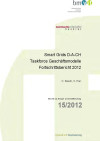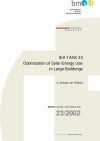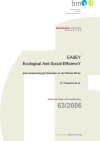Suchergebnisse für "Factsheet: Energietechnologien gestalten, die für alle sinnvoll und nutzbar sind"
Technological as well as economical optimized Biomass CHP systems with regard to state-of-the-art technologies.
Analysis and presentation of representative biomass CHP systems with an electric power output of less than 2 MW. Variation of parameters and identification of potential optimized interactions between specific units. Identification of the economically and thermodynamically most optimized interconnection based on state-of-the-art technologies.
Valuation models for future energy clusters considering market, technology and policy uncertainty - Case Study Biomass
Market liberalization, technological change and increasing complexity of international policy processes (e .g. climate negotiations) necessitate new approaches to evaluating investments in an uncertainty and risk-augmented framework. This project developed valuation methods from financial theory - such as real options valuation and portfolio optimization - to quantify the relative competitiveness of bioenergy chains and total energy systems.
fit4power2heat
The integration of heat pumps can increase the cost effectiveness of existing heating networks and counter the high costs for the expansion of power grids at the same time. Aim of the project is to develop innovative business models for small and medium municipal heating networks with focus on synergies between heat and power market. Main focus is a heat pump pooling for several heat grids.
G2G – Innovation axis Graz-Gleisdorf
Development of testbeds and demonstration zones within already designated areas for urban development along the Graz-Gleisdorf Innovation-Axis with a focus on energy, integrated building technology, smart city-spaces, compact settlement structures, generational living, and ‘cities of short ways’. It will pay specific attention to intermodal mobility as well as ICT-based solutions.
BIGMODERN - Subproject 5: Feasibility studies about innovative technical solutions
The application of innovative technologies means additional planning and coordination effort which usually cannot be incorporated into the conventional planning processes of the BIG. To overcome these barriers for the application of innovative technologies, the sub project at hand aims at preparing information, feasibility studies, planning records, experiences and practical examples in a way, that they can be implemented directly into the planning process.
CO2-Demobau - Exploration of the feasibility of carbon-neutral model construction sites
By highlighting green innovations, networking with stakeholders in the construction industry and applying the findings of the previous study "CO2 neutrale Baustelle", the foundation is set for future carbon-neutral model construction sites. These construction sites will serve as best-practice examples in the fields of contracting, construction operations organization and technology.
baubehoerde.at - Development of a Vision 2030 for a Digital Building Authority and Recommendations for Action in Austria
In Austria, planning permission applications are submitted and managed largely manually. The aims of the baubehoerde.at project are to evaluate the potential and limitations of digitizing building approval processes and to create a Vision 2030 strategy for a digital building authority.
VERTICAL FARMING - Investigation on requirements of a Vertical Farm-prototype development for crop plant production
In the center of interest stands the investigation of fundamental principles for a new building typology – the Vertical Farm. Urban vertical food production can contribute to more energy efficient cities by concurrently reducing land use. Substantial influencing factors to achieve these goals are intended to be revealed.
Sorption cooling and air dehumidification device
Solar-assisted air-conditioning in combination with comfortable controlled ventilation systems soon possible and affordably for building owners. With a new part DEC-systems should become acceptance.
Solar Heat Worldwide: Marktbericht über Solarwärmetechnologien (Edition 2009)

Markets and Contribution to the Energy Supply 2007
Werner Weiss, Irene Bergmann, Roman Stelzer (AEE INTEC - AEE Institute for Sustainable Technologies)
Herausgeber: IEA Solar Heating & Cooling Programme
Englisch
IEA SHC Annual Report 2008

Annual Report 2008 - IEA Programme Solar Heating & Cooling, Tasks 35-40
Englisch
Smart Grids D-A-CH Taskforce Geschäftsmodelle

Fortschrittsbericht 2012
Schriftenreihe
15/2012
C. Resch, C. Pier
Herausgeber: BMVIT
Deutsch, 96 Seiten
Downloads zur Publikation
IEA Task 23 Optimization of Solar Energy Use in Large Buildings

Schriftenreihe
23/2002
S. Geissler, W. Tritthart
Deutsch, 235 Seiten
Downloads zur Publikation
IEA ECBCS Annex 49 Midterm Report (2010)

Low Exergy Systems for High-Performance Buildings and Communities
Englisch
EASEY - Ecological And Social EfficiencY

eine Anwendung als Subindex an der Wiener Börse
Schriftenreihe
63/2006
R. Paulesich et al.
Herausgeber: BMVIT
Deutsch, 112 Seiten
Downloads zur Publikation
Film "Bauen mit Hausverstand - Das Haus der Zukunft"
Das "Haus der Zukunft" - Dokumentation über ambitionierte Pilotprojekte Jetzt mit DVD-Bestellmöglichkeit!
Urban consolidation Lehen - subproject 6a and 6b: Energy efficient urban districts by means of community organizing and social measures in urban consolidation
Community organizing is used as a method to develop an activating social process to inform and include involved people in the district concerning new buildings but also in the process of urban renewal. Experiences and feedback were worked on scientifically to give feedback to the community as well as to builders and planners.
Watersorption - Water absorption of Wood Plastic Composites
Analysis of the water absorption in Wood Plastic Composites (WPC) in order to develop solutions to decrease and stop water absorption. This enables a big variety of new applications made of WPC and brings economical and ecological advantages for the polymer processing industries.
CityStore - Sondierung des wesentlichen F&E-Bedarfs zur Optimierung von städtischen Energiespeichern in integrierten Energiesystemen
CityStore pursues a first-of-its-kind, innovative approach on spatial location of storage needs and potentials. This includes the evaluation of concrete challenges and prerequisites as well as the identification of useful storage technologies and capacities. Model calculations for the model cities Graz and Weiz will be carried out. If, and to which extent, the results can be generalized will be investigated in the Follower Region South Burgenland. The results should enable optimized planning and realization of urban energy storage facilities – thereby enabling targeted investments in energy infrastructure to achieve (local) climate and energy targets.
ThermoCluster - Heat generation from infrastructure projects and integration into decentralised low-temperature heating and cooling networks for plus-energy districts
Integrative assessment of the geothermal potential of the Brenner base tunnel and the northern portal area, and the subsequent distribution of the heat generated from these sources to the end-consumer in potential plus-energy districts of the city of Innsbruck.
